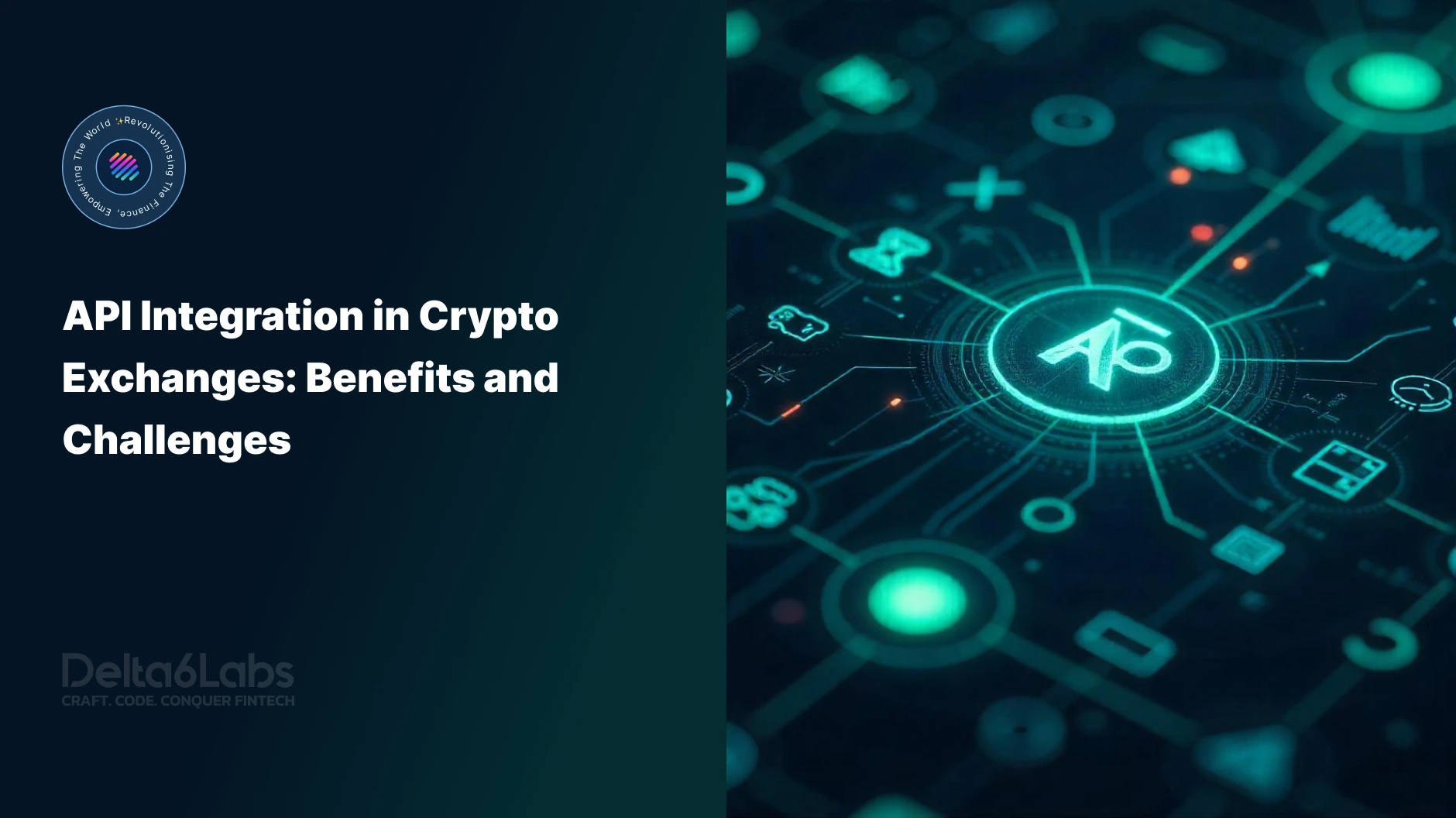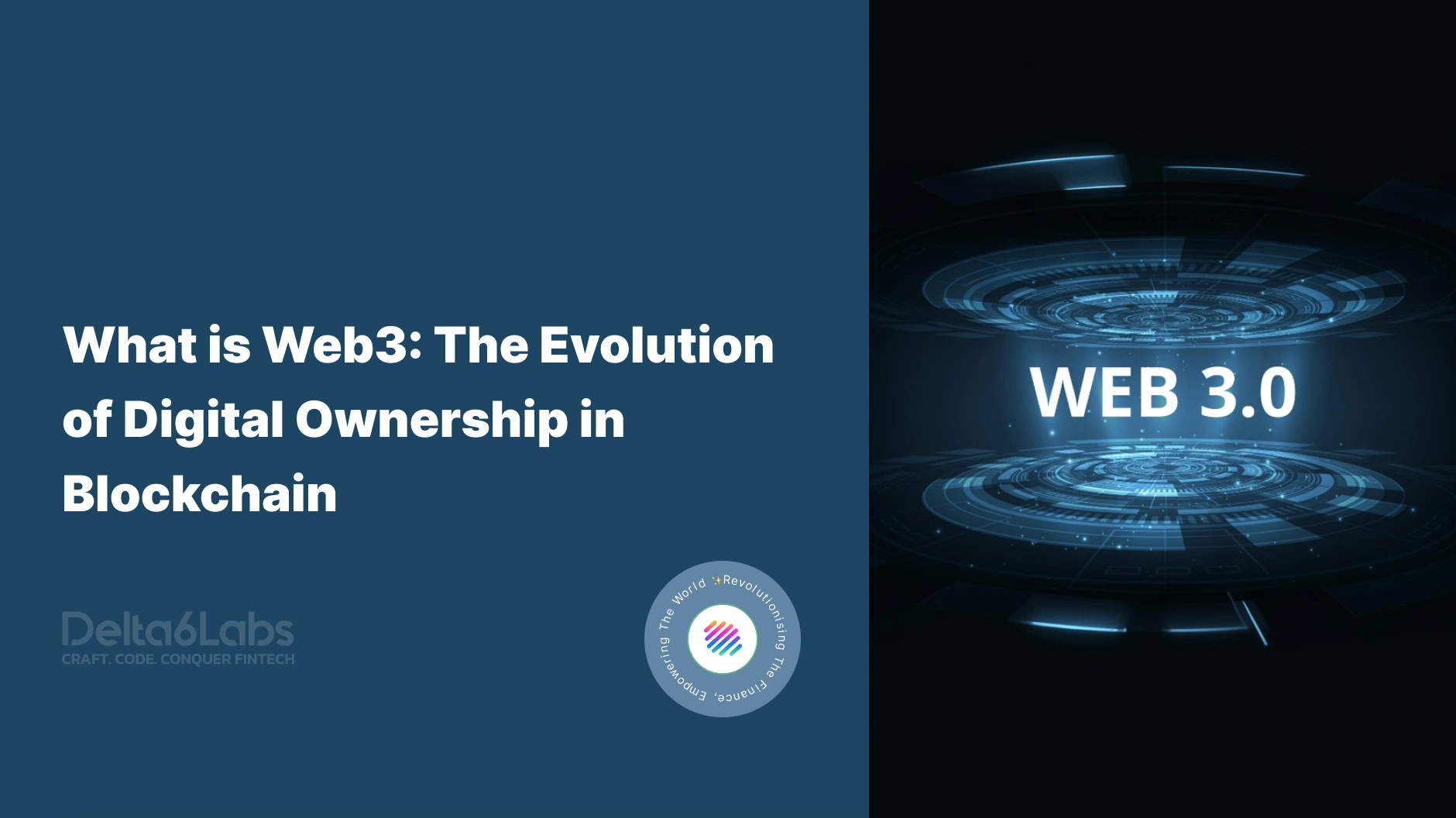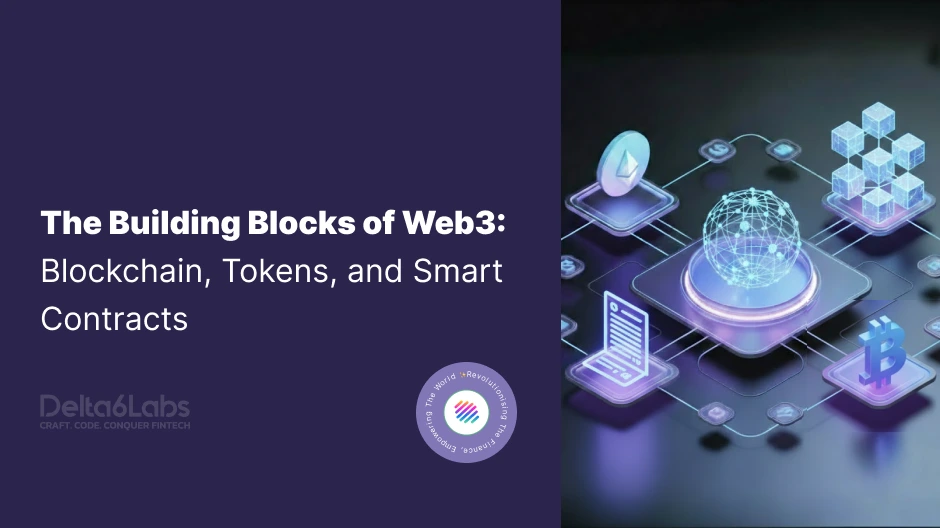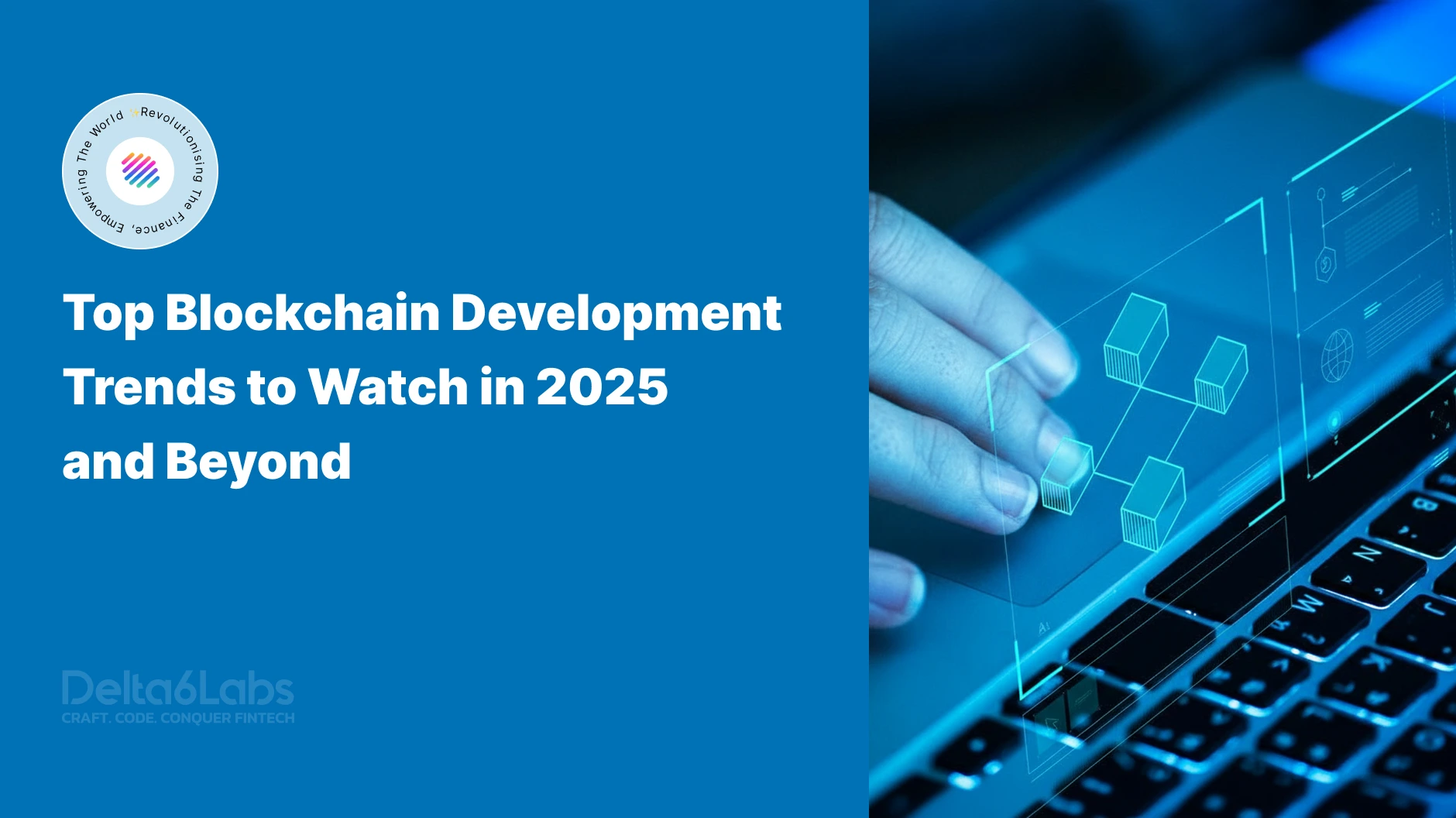API Integration in Crypto Exchanges: Types, Benefits and Challenges
Table of Contents
One major factor that has played a pivotal role in the evolution of cryptocurrency exchanges is the integration of Application Programming Interfaces (APIs). From enhancing trading efficiency to improving scalability, the successful integration of APIs has revolutionized the Decentralized Finance (DeFi) landscape. But before we dive deeper into the benefits and challenges of API integration in crypto exchanges, it is essential to understand what APIs are. What is their significance in the crypto industry? How are they playing significant roles in the success of crypto exchanges in 2025? In this article, we will discuss every important aspect of the API integration in crypto exchanges.
What are Application Programming Interfaces (APIs)?
Application Programming Interfaces, commonly known as APIs, act as a bridge between software programs interacting with each other. In simple terms, APIs allow multiple software applications to communicate with each other within an application. If we discuss the role of APIs in cryptocurrency exchanges, they help developers, traders, and third-party applications to interact with the data provided by a crypto exchange.
APIs were integrated with crypto exchanges since their inception, but at that time, they were primarily used for data pulling. However, with the evolution of cryptocurrency exchanges and advancements in technology, the role of APIs has become more crucial, and they are now being used in trading strategies, Data analysis, and other financial activities.
Types of APIs
Public APIs
These are the APIs that are available for any developer without restrictions. Public APIs are also known as open or external APIs. These can be accessed by employing OAUTH, using API keys, and by registration.
Partner APIs
These APIs are slightly different from open APIs, as in this kind of API, the developers are allowed to access the API by obtaining a license or rights from the API owners. They are generally owned by third parties, which permit external developers to integrate these APIs into their applications. eBay API and Amazon API are among the famous examples of partner APIs.
Composite APIs
Composite APIs are the most advanced form of APIs, as they are used for integrating complex systems. In several cases, interacting with websites is a time-consuming and complex process. To fix this issue, composite APIs are used. These APIs can combine multiple APIs to create a unified interface that enables simultaneous interaction with different services.
Internal APIs
These APIs are helpful in enabling smooth interaction between various functionalities within an enterprise. These APIs are also known as private APIs. Internal APIs enhance the development process by promoting collaboration and reusability.
Importance of APIs in Crypto Exchanges
Better Trading Efficiency
The integration of APIs is improving trading efficiency in cryptocurrency exchanges. APIs can help automated trading strategies in executing orders in real-time with precision, which can provide users a competitive edge over other users who are managing trading and market research manually.
For example, an automated trading bot can execute trading 24*7, that too in real-time with precision, which is not possible for human traders because the human body has physical and mental limitations.
Enhanced User Experience
Cryptocurrency exchanges design their interfaces for a variety of traders, which may not suit some traders who need more real-time data or a comprehensive dashboard. To solve this issue, professional traders incorporate APIs into their trading systems, which allows them to collect data from various sources and create an interface that suits their trading requirements.
Real-time Data
APIs allow traders to access real-time market data, price fluctuations, order book data, trading volume, and analyzed trading patterns. This information is extremely helpful for traders in making informed and immediate decisions in the cryptocurrency market to maximize their profits and mitigate their risks.
Scalability
A crypto exchange can enhance its features and functionalities by leveraging third-party interactions through APIs. It helps exchanges provide the maximum number of services without changing their existing infrastructure.
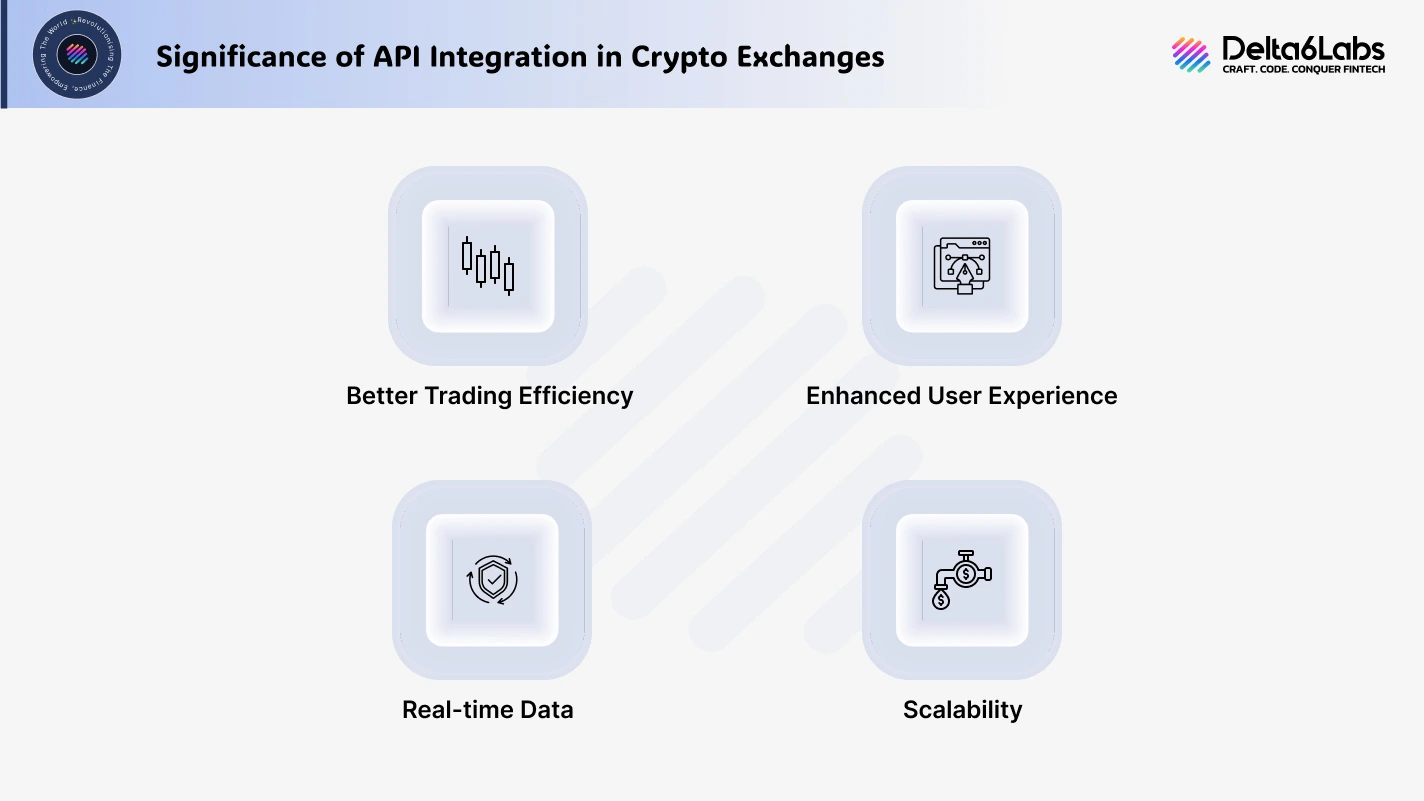
Challenges of APIs in Crypto Exchanges
Security Risks
Security is one of the primary concerns in API integration, as it serves as the medium through which any malicious code or virus can enter the application and make the system prone to cyberattacks. These attacks can make the application lose its integrity and credibility among users. To address this issue, it is vital for the exchange to implement advanced security measures. Regular security audits, encryption mechanisms, and secured authentication techniques can be used to provide an additional layer of security.
Compliance Issues
Adhering to the regulatory framework designed by regulatory bodies, such as FATF, the FIU, and regional bodies, is already a difficult task for the exchanges. Additionally, the integration of APIs with cryptocurrency exchanges can escalate this issue because crypto regulations are still evolving worldwide, and it is tricky to meet the diverse needs across multiple jurisdictions.
Diverse System Architecture
Every application has a different architecture, which means the API integration process for every application and software will also be different from the other. If the requirements suggest that there is a need to integrate APIs with multiple applications, then developers would need insight into the design architecture of each application. This process will take more time and energy and may also increase the operational cost.
Integration Complexity
API integration can be a complex process, and difficult for users with less technical understanding. The API integration documentation is complex, and it requires continuous updates and ongoing maintenance. This is one of the biggest challenges crypto exchanges face while integrating various APIs.
Examples of API Integration in Crypto Exchanges
Coinbase API
Coinbase API is one of the most powerful APIs in the cryptocurrency trading landscape. It allows users to trade seamlessly by offering deep liquidity, top-tier execution, real-time market data, enhanced efficiency, and opportunities to earn rewards. Coinbase API also provides an intuitive and user-friendly interface to its users.
Binance API
Binance is the world’s most successful and popular cryptocurrency exchange, having one of the highest numbers of active users. It offers access to Spot, Margin, Futures, and Options API trading for more than 300 crypto and fiat currencies. Binance API supports REST and WebSocket protocols, which offer flexibility to users. It also provides users with real-time market data and insights. It provides a testing environment as well to test use cases for free.
Kraken API
Known for its advanced security, the Kraken API is very popular among traders. It allows users with deep liquidity to have direct access to order books and enjoy low fees, along with low-latency endpoints for 24/7 crypto trading. It also supports REST, WebSocket, and FIX Protocol, which enables institutional trading and seamless request-response messaging over HTTP.
Conclusion
The Integration of Application Programming Interfaces (APIs) into cryptocurrency exchanges is proven to be worthwhile. It has enhanced the scalability of crypto exchanges and the user experience. APIs enable traders to access real-time data and market insights, helping them make informed decisions and maximize their profits.
The integration of APIs enhances the overall efficiency of the crypto exchange and enables automated trading strategies to execute orders in real-time with precision, providing users a competitive edge over those who manually manage trading and market research. There are multiple types of APIs, divided according to the requirements of traders and developers. Public or open APIs are accessible to any developer, whereas partner APIs help crypto exchanges interact with third parties.
The Coinbase API, Binance API, and Kraken API are successful API integrations in the cryptocurrency industry that have enhanced the user experience and empowered traders by providing them with customized features. If you’re looking to build or scale a high-performance crypto exchange with secure, real-time API integration, Delta6Labs is your trusted technology partner.
Frequently Asked Questions
Disclaimer:
The information on this blog is for knowledge purposes only. The content provided is subject to updates, completion, verification, and amendments, which may result in significant changes.
Nothing in this blog is intended to serve as legal, tax, securities, or investment advice of any investment or a solicitation for any product or service.
